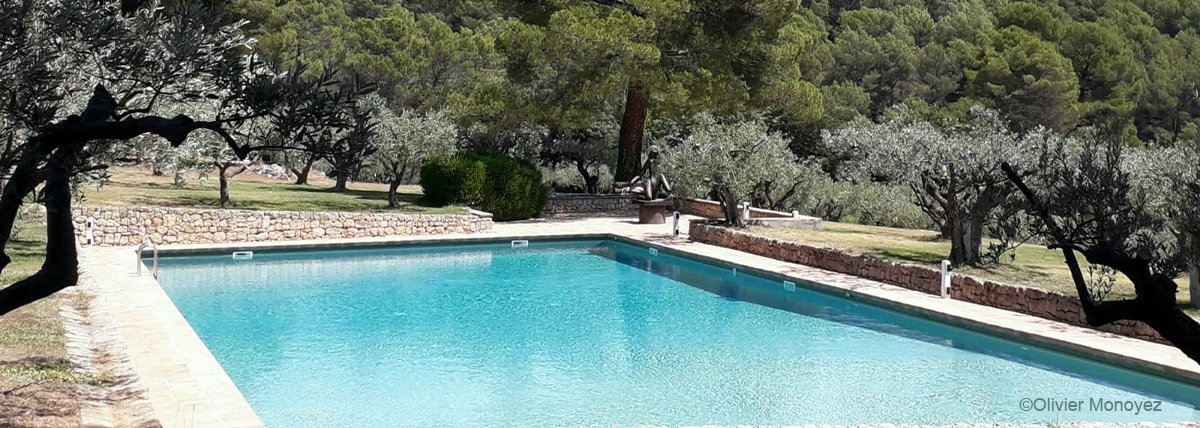
September 2021
AGENDA
SEMINARS
FSER Laureates meeting – organized by Patrick Melhen
“Since 2000, the Schlumberger Foundation for Education and Research has been selecting yearly three laureates among the best researchers who are building their team in the field of bio-medical research. They are awarded a prize which supports the creation of their laboratory. Today they are grouped together within the Cercle FSER, and all the winners are committed to defending and promoting fundamental research. ” Every three years, they meet at Les Treilles to report on the progress of their research.
Using light for targeted interrogation of neural circuits and behaviour – organized par Valentina Emiliani & Michael Hausser
Recent and dramatic developments in optogenetic probes, genetically encoded activity sensors, and new microscopies now make it possible to fully record and manipulate the activity of neural circuits using light. These advances promise to address many fundamental challenges in neuroscience, particularly regarding the transformation of our research into the neural code and the links between neural circuit activity and behaviour.
Neurotoxicology and neuroplasticity – organized by Alain Trembleau & Anna Benczik
Humans are exposed to an increasing number of neurotoxic substances, the effects of which on the plasticity of the brain remain largely unknown. Today more than ever, it is necessary to improve the neurotoxicity screening strategy. Linking different types of expertise (neurotoxicology, neuroplasticity, risk assessment), our multidisciplinary seminar aims to offer a new strategic vision for future research and risk assessment in neurotoxicology, as well as the communication strategies to be implemented.
RESIDENTIAL STUDIES
Monks facing history. Thinking of the past in written culture in Ethiopia in the Middle Ages – Bertrand Hirsch
This work is intended to be a synthesis of the way in which Ethiopian scholars – monks, then the only masters of writing – thought about and wrote the history of their society during a long Middle Ages period which spanned from the 14th to the 17th centuries; a book designed to address a wider audience than that of only specialists in Africa or Ethiopia and whose ambition is to show what the study of the culture of an African society can bring to our thoughts on history. In this book, the author offers a route through several works written in the geez language, the language of culture of the time, by endeavoring to show the diversity of forms taken by these analyzes of the past, which cut across several genres (annals, chronicles, hagiographies) and interweave what we distinguish as history, mythology or fiction.
Circular symmetry in algebraic topology – Magdalena Kedziorek
The objective of this meeting is to understand the spectra of rational equivariant rings using algebraic models, by computing a highly structured and complicated invariant called “topological Hochschild homology” (THH). We plan to understand the additional structure on the classical cyclic bar construction of THH applied to an equivariant ring spectrum. The main interest group in the proposed project is SO (2), a major advance over previous results, which focused on finite cyclic groups.
RESIDENCIES
AUTHOR’S RESIDENCY
Geneviève Parot
Her novel project will be situated in the near future, between dystopia and farce: the burden represented by the cohort of inactive and unproductive (but not dependent) elderly people, experienced as a “bottomless pit”, has become unbearable. A new concept has germinated in power circles: voluntary departure training, dubbed a “great humanitarian cause”. The tool created to implement it is the “Dignified Departure Training Establishment”. The aim is to get people to consider, then accept and then desire their own disappearance. These D.D.T.E. multiply, and meet with growing success. [find out more]
PHOTOGRAPHY RESIDENCY
Sophie Hatier
“The Camargue region is the reverse of an island. A body of water in the middle of the land. Ponds, salt marshes, fresh water, brackish water… A landscape which seems so wild but which also results from human interventions of long time on a very particular biotope, an attempt of domestication by clever transfers of fluids… A Mediterranean space, with its colors, its composition and its material. And on which the light acts as a revealer.” By broadening her work to other forms of life: plants, fauna and portraits, this search for a form, starting from nature and moving towards the human, has always been at the heart of Sophie’s work. [find out more]
40 years of research, creation and publications
A grand-parent keen on History…
An eminent member of the Schlumberger family, Gustave, numismatist and historian specializing in the Byzantine period, was also a great collector and a generous donor, two traits he shares with our founder. He was the source of numerous publications and in 1890 when his “Nicephore Phocas” appeared, he wrote : “The history of the Byzantine Empire is yet to be done. I have tried to bring a chapter from these moving annals to the attention of the historical study-loving public. »
It is this praiseworthy motivation that we find in the publications resulting from stays at the Treilles of renowned historians, regardless of the period studied and whatever the country mentioned. Southern Europe, and Greece in particular, will be the subject of several issues. Thus from 1988, under the direction of Georges B. Dertilis, will be published : Bankers, usurers and peasants. Credit networks and strategies of capital in Greece (1780-1930), La Découverte (I.e. the Hellenizing session), then in 1993 under the direction of Stuart Woolf : Spaces and families in southern Europe in the modern age, House of Human Sciences, and in 2006 the book by Violetta Hionidou, Famine and death in occupied Greece, 1941-1944, Cambridge University Press. More recently in 2015, Paulin Ismard, following a residential study in 2014, will publish Democracy Against Experts. Public slaves in ancient Greece, at the Seuil editions.
The most represented historical period is undoubtedly the Middle Ages through the works of Pierre Toubert and Michel Zinc (Dir.), Moyen Âge et Renaissance au Collège de France (Middle Ages and Renaissance at the Collège de France), Fayard, in 2009, by Philippe Sénac, History and archeology of the Muslim West (7th – 15th centuries): Al-Andalus, Maghreb, Sicily, Meridian Collection, series “Medieval Iberian Studies”, 2012, by Dominique Barthélémy and Jean-Marie Martin (Eds.), Richesse et croissance au Moyen Âge. Orient et Occident (Wealth and growth in the Middle Ages. Orient et Occident), ACHCByz, 2014, by Stéphane Boisselier & John Tolan (Eds.), La cohabitation religieuse dans les villes européennes, Xe-XVe siècles (Religious cohabitation in European cities, 10th-15th centuries), Editions Brepols, 2014, or more recently works by Patrick Boucheron including Georges Duby, Georges Duby, Portrait de l’historien en ses archives (Portrait of the historian in his archives), co-published by Gallimard and the Fondation des Treilles in 2015 or La trace et l’aura. Posthumous lives of Ambrose of Milan (4th-16th century), at the Seuil editions in 2019.
The study of Armenian history will give birth to two publications by Anouche Kunth (CNRS 2020 bronze medal): with Claire Mouradian, Les Arméniens en France (Armenians in France), Editions de l’Attribut in 2010 and Exils arméniens. Du Caucase à Paris 1920-1945 (Armenian exiles, from Caucasus to Paris), published by Belin in 2016.
The list would be incomplete without the mention of the work of the prehistorian Henry de Lumley La montagne sacrée du Bego (The sacred Bego mountain), CNRS Editions, 2011, the two volumes of Lieux de savoir (Places of knowledge), edited by Christian Jacob, published by Albin Michel in 2007 and 2011 (cf. Activities 2004) as well as the book Europa, our story, published at the Arènes in 2017 under the direction of Etienne François and Thomas Serrier.
Applications deadlines
Do you wish to apply to one of the activities offered by the Fondation des Treilles? Please consult the deadlines schedule below and the page dedicated to each activity to know more about our application procedures.
– For Seminars (for 2023) : September 17, 2021
– For Residential Studies, small groups (for 2022) : September 17, 2021
– For Residential Studies, large groups (for 2023) : September 17, 2021
– The Photography Residency Prize (for 2022) : October 1st, 2021
– The Young Researcher Prize (for 2022) : October 30, 2021
